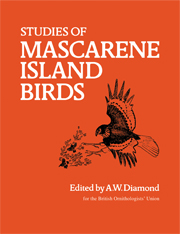Book contents
- Frontmatter
- Contents
- List of contributors
- Foreword
- Introduction
- I The native avifauna of the Mascarene Islands
- 1 An ecological history of the Mascarene Islands, with particular reference to extinctions and introductions of land vertebrates
- 2 The fossil record
- 3 Vocalisations of the endemic land-birds of the Mascarene Islands
- II The surviving native birds of Mauritius
- 4 The ecology of the smaller land-birds of Mauritius
- 5 The larger land-birds of Mauritius
- III The surviving native birds of Réunion and Rodrigues
- 6 The ecology of the surviving native land-birds of Réunion
- 7 Notes on the nesting of Procellariif ormes in Réunion
- 8 Observations on the surviving endemic birds of Rodrigues
- IV Measurements and weights
- 9 Measurements and weights of the surviving endemic birds of the Mascarenes and their eggs
- References
- Index
Introduction
Published online by Cambridge University Press: 04 August 2010
- Frontmatter
- Contents
- List of contributors
- Foreword
- Introduction
- I The native avifauna of the Mascarene Islands
- 1 An ecological history of the Mascarene Islands, with particular reference to extinctions and introductions of land vertebrates
- 2 The fossil record
- 3 Vocalisations of the endemic land-birds of the Mascarene Islands
- II The surviving native birds of Mauritius
- 4 The ecology of the smaller land-birds of Mauritius
- 5 The larger land-birds of Mauritius
- III The surviving native birds of Réunion and Rodrigues
- 6 The ecology of the surviving native land-birds of Réunion
- 7 Notes on the nesting of Procellariif ormes in Réunion
- 8 Observations on the surviving endemic birds of Rodrigues
- IV Measurements and weights
- 9 Measurements and weights of the surviving endemic birds of the Mascarenes and their eggs
- References
- Index
Summary
Background to the expedition (AWD)
In 1970 the Council of the British Ornithologists’ Union decided on a policy of promoting expeditions to study ecologically little-known endangered species (Mountfort 1970). The first proposed survey was to be in Cuba, but for various reasons this plan had to be abandoned. However, a timely visit to Dr D. W. Snow, then Chairman of the Research Committee, by Dr France Staub, then Chairman of the Mauritian National Section of the International Council for Bird Preservation, drew the Union's attention to the Mascarenes and the proposed expedition was formally announced in January 1972 (Ibis 114: 138). The IUCN Red Data Book vol. 2 (Aves) (Vincent 1966, partly revised 1971) listed 11 species or forms from the Mascarenes, four of which were given ‘three-star’ ratings, their rarity giving rise to ‘very grave anxiety’ as to their prospects for survival. None of these birds was well known biologically and there was thus a strong case for further investigation. The urgency of action and a plan for research had already been outlined by F. R. G. Rountree as early as 1950 (Rountree 1951), but it is doubtful whether his report was seen by many outside Mauritius, and the matter thus lay fallow for another 20 years, there being no one available locally to do the necessary work. Since 1950 the natural habitat has been substantially reduced, and the birds thus made rarer.
Coincidentally, and independently, Dr Stanley Temple then of Cornell University had put forward a project to study the endangered birds of prey in the Indian Ocean, with particular attention to the Mauritius Kestrel Falco punctatus, the rarest of them.
- Type
- Chapter
- Information
- Studies of Mascarene Island Birds , pp. 1 - 4Publisher: Cambridge University PressPrint publication year: 1987

